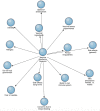Understanding COVID-19 Vaccine Hesitancy in Ethnic Minorities Groups in the UK
- PMID: 35844884
- PMCID: PMC9284000
- DOI: 10.3389/fpubh.2022.917242
Understanding COVID-19 Vaccine Hesitancy in Ethnic Minorities Groups in the UK
Abstract
COVID-19 vaccines have been developed and administered at record pace in order to curtail the impact of the COVID-19 pandemic. Vaccine hesitancy has impacted uptake unequally across different groups. This study explores the drivers for vaccine hesitancy in ethnic minority groups in the UK, the impact of social media on vaccine hesitancy and how vaccine hesitancy may be overcome. Twelve semi-structured interviews were conducted, coded and thematically analyzed with participants from ethnic minority groups in the UK who identified as vaccine hesitant. Social media played a significant role in vaccine hesitancy. For those who considered themselves healthy, seeing misinformation of extreme side effects relating to COVID-19 vaccinations on social media resulted in the opinion that the risk of vaccination is greater than risk from COVID-19 infection. For women, misinformation on social media regarding fertility was a reason for delaying or not getting vaccinated. Participants who had sources of information they trusted in outside of social media were more likely to choose to get vaccinated. This study identified the broad spectrum of views on vaccine hesitancy in ethnic minority groups in the UK. Enabling factors such as a desire to travel, and positive public health messaging can increase vaccine uptake, whereas a lack of trusted sources of information may cause vaccine hesitancy. Further research is required to combat misinformation and conspiracy theories. Effective methods include actively responding and disproving the misinformation. For an inclusive vaccination programme that reduces health inequality, policy makers should build trust amongst marginalized communities and address their concerns through tailored public health messaging.
Keywords: COVID-19; ethnic minorities; hesitancy; social media; vaccine.
Copyright © 2022 Naqvi, Li, Woodrow, Yadav and Kostkova.
Conflict of interest statement
The authors declare that the research was conducted in the absence of any commercial or financial relationships that could be construed as a potential conflict of interest.
Figures
Similar articles
-
Overcoming COVID-19 vaccine hesitancy among ethnic minorities: A systematic review of UK studies.Vaccine. 2022 May 31;40(25):3413-3432. doi: 10.1016/j.vaccine.2022.04.030. Epub 2022 Apr 28. Vaccine. 2022. PMID: 35534309 Free PMC article.
-
Virtual town halls addressing vaccine hesitancy among racial/ethnic minorities: Preliminary findings.J Am Pharm Assoc (2003). 2022 Jan-Feb;62(1):317-325. doi: 10.1016/j.japh.2021.11.005. Epub 2021 Nov 10. J Am Pharm Assoc (2003). 2022. PMID: 34996576 Free PMC article.
-
"I'd just love to hear what the community has to say": Exploring the potential of community-driven vaccine messaging amongst ethnic minority communities.Hum Vaccin Immunother. 2024 Dec 31;20(1):2423469. doi: 10.1080/21645515.2024.2423469. Epub 2024 Nov 5. Hum Vaccin Immunother. 2024. PMID: 39501658 Free PMC article.
-
Coronavirus conspiracy suspicions, general vaccine attitudes, trust and coronavirus information source as predictors of vaccine hesitancy among UK residents during the COVID-19 pandemic.Psychol Med. 2023 Jan;53(1):236-247. doi: 10.1017/S0033291721001434. Epub 2021 Apr 12. Psychol Med. 2023. PMID: 33843509 Free PMC article.
-
Addressing vaccine hesitancy and resistance for COVID-19 vaccines.Int J Nurs Stud. 2022 Jul;131:104241. doi: 10.1016/j.ijnurstu.2022.104241. Epub 2022 Apr 1. Int J Nurs Stud. 2022. PMID: 35489108 Free PMC article. Review.
Cited by
-
A Snapshot of COVID-19 Vaccine Discourse Related to Ethnic Minority Communities in the United Kingdom Between January and April 2022: Mixed Methods Analysis.JMIR Form Res. 2024 Mar 26;8:e51152. doi: 10.2196/51152. JMIR Form Res. 2024. PMID: 38530334 Free PMC article.
-
The Community Pharmacy as a Study Center for the Epidemiological Analysis of the Population Vaccination against SARS-CoV-2: Evaluation of Vaccine Safety and Pharmaceutical Service.Pharmacy (Basel). 2024 Jan 20;12(1):16. doi: 10.3390/pharmacy12010016. Pharmacy (Basel). 2024. PMID: 38392923 Free PMC article.
-
'I don't know what to do or where to go'. Experiences of accessing healthcare support from the perspectives of people living with Long Covid and healthcare professionals: A qualitative study in Bradford, UK.Health Expect. 2023 Feb;26(1):542-554. doi: 10.1111/hex.13687. Epub 2022 Dec 13. Health Expect. 2023. PMID: 36512382 Free PMC article.
-
A Systematic Review of Population-Based Studies Assessing Knowledge, Attitudes, Acceptance, and Hesitancy of Pregnant and Breastfeeding Women towards the COVID-19 Vaccine.Vaccines (Basel). 2023 Jul 27;11(8):1289. doi: 10.3390/vaccines11081289. Vaccines (Basel). 2023. PMID: 37631857 Free PMC article. Review.
-
Evaluating a WeChat-Based Intervention to Enhance Influenza Vaccination Knowledge, Attitude, and Behavior Among Chinese University Students Residing in the United Kingdom: Controlled, Quasi-Experimental, Mixed Methods Study.JMIR Form Res. 2024 Oct 24;8:e55706. doi: 10.2196/55706. JMIR Form Res. 2024. PMID: 39447171 Free PMC article.
References
-
- WHO . Vaccination: European Commission and World Health Organization Join Forces to Promote the Benefits of Vaccines. World Health organization (2019). Available online at: https://www.who.int/news/item/12-09-2019-vaccination-european-commission... (accessed July 8, 2021).
Publication types
MeSH terms
Substances
LinkOut - more resources
Full Text Sources
Medical





